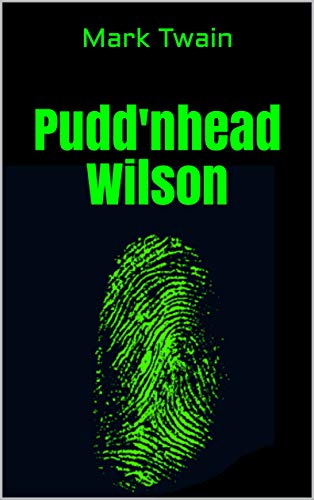Mark Twain
Pudd'nhead Wilson
eBook
( June 13, 2020)
Pudd'nhead Wilson (1894) is a novel by American writer Mark Twain. Its central intrigue revolves around two boys—one, born into slavery, with 1/32 black ancestry; the other, white, born to be the master of the house. The two boys, who look similar, are switched at infancy. Each grows into the other's social role.
The story was serialized in The Century Magazine (1893-1894), before being published as a novel in 1894.
Mark Twain's satire humorously and pointedly lambastes everything from small-town politics and religious beliefs to slavery and racism.
Irony and small-town life:
David Wilson makes a joke that is misunderstood by the townsfolk of Dawson's Landing, who take Wilson's words literally. They consider the subtle, intelligent Wilson to be a simpleton. Word of the joke spreads quickly, and Wilson becomes known as "Pudd'nhead" for being a fool in the eyes of the townspeople.
Racism and nature versus nurture:
The first part of the book seems to satirize racism in antebellum Missouri by exposing the fragility of the dividing line between white and black. The new Tom Driscoll is accepted by a family with high Virginian ancestry as its own, and he grows up to be corrupt, self-interested, and distasteful.The reader does not know, at the end of the story, whether Tom's behavior results from nature or nurture. One could interpret the story as a vindication of racism based on biological differences too subtle to be seen. (The essentialism is not reciprocal, however. Chambers adapts well to life as a slave and fails to successfully assume his proper place as a high-class white.)
Technology and subversion:
The novel features the technological innovation of the use of fingerprints as forensic evidence. "The reader knows from the beginning who committed the murder, and the story foreshadows how the crime will be solved. The circumstances of the denouement, however, possessed in its time great novelty, for fingerprinting had not then come into official use in crime detection in the United States. Even a man who fooled around with it as a hobby was thought to be a simpleton, a 'pudd'nhead'."
The story was serialized in The Century Magazine (1893-1894), before being published as a novel in 1894.
Mark Twain's satire humorously and pointedly lambastes everything from small-town politics and religious beliefs to slavery and racism.
Irony and small-town life:
David Wilson makes a joke that is misunderstood by the townsfolk of Dawson's Landing, who take Wilson's words literally. They consider the subtle, intelligent Wilson to be a simpleton. Word of the joke spreads quickly, and Wilson becomes known as "Pudd'nhead" for being a fool in the eyes of the townspeople.
Racism and nature versus nurture:
The first part of the book seems to satirize racism in antebellum Missouri by exposing the fragility of the dividing line between white and black. The new Tom Driscoll is accepted by a family with high Virginian ancestry as its own, and he grows up to be corrupt, self-interested, and distasteful.The reader does not know, at the end of the story, whether Tom's behavior results from nature or nurture. One could interpret the story as a vindication of racism based on biological differences too subtle to be seen. (The essentialism is not reciprocal, however. Chambers adapts well to life as a slave and fails to successfully assume his proper place as a high-class white.)
Technology and subversion:
The novel features the technological innovation of the use of fingerprints as forensic evidence. "The reader knows from the beginning who committed the murder, and the story foreshadows how the crime will be solved. The circumstances of the denouement, however, possessed in its time great novelty, for fingerprinting had not then come into official use in crime detection in the United States. Even a man who fooled around with it as a hobby was thought to be a simpleton, a 'pudd'nhead'."
- Pages
- 132
Enjoy reading Pudd'nhead Wilson? You may also like these books
-

Mark Twain
The Complete Adventures of Tom Sawyer & Huckleberry Finn
eBook (Musaicum Books Dec. 6, 2017) -
Z

Mark Twain
Adventures of Huckleberry Finn
Paperback (CreateSpace Independent Publishing Platform March 1, 2019) -

Mark Twain
The Adventures of Tom Sawyer: Original Illustrations
Paperback (SeaWolf Press May 6, 2018) -

Mark Twain
The Adventures of Tom Sawyer AND The Adventures of Huckleberry Finn
Hardcover (Benediction Classics March 25, 2020) -
Z

Mark Twain
The Adventures of Tom Sawyer
Paperback (CreateSpace Independent Publishing Platform June 24, 2015)












